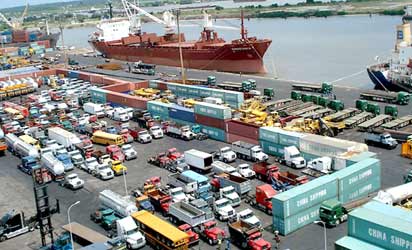By Godwin Oritse

STAKEHOLDERS in the Nigeria maritime industry have blamed the high port charges on corruption and other sharp practices saying that there are payments that are not official.
Speaking on the recent report of a study commissioned by the Nigerian Ports Authority, NPA, on port charges, the Vice President of the Association of Nigerian Licensed Customs Agents, ANLCA, Mr. Kayode Farinto, said that the issue of corruption cannot be ruled out noting that it has negatively affected the cost of cargo at the Nigerian ports.
Farinto said corruption and under the table payments account for about 30 percent of the charges while arbitrary charges by government agencies and private operators stand at about 55 percent.
He said: “If you look at the percentage of under the table cuts which is about 30 percent of the port charges and compare that to the 55 percent of arbitrary charges being collected by government agencies and private operators, then you can agree with our submission. The 30 percent illegal charges cannot be traced but the 55 percent traceable arbitrary payment should be dealt with to reduce the cost of clearance.”
In his submission, former Special assistant to ex-President Goodluck Jonathan, Mr. Leke Oyewole, told Vanguard Maritime Report that Nigerian ports remain the cheapest in the world going by official charges. Oyewole said that inefficiency and corrupt practices were the reasons for the increased cost of cargo clearance.
READ ALSOBlaming FG for coronavirus spread insensitive – NATBO
He explained that going by the official tariffs, Nigeria remains very cheap adding that some uncertainties like ship security and safety add up to the cost currently being experienced at the ports.
He said: “I will almost say that the Nigerian ports are one of the cheapest ports in the world not only in Africa or West Africa. Of a truth, certain corrupt practices and inefficiencies have led to importers to pay more than they should have ordinarily paid. Going by the tariffs, Nigeria is a very cheap port but because the ship is coming to an unsafe zone, they charge more for bringing the cargoes to Nigeria.
“And because of the congestion at the ports, the ships stay longer than they should have ordinarily stayed and they will also transfer that cost to the importers. When the cargoes are discharged, the process of clearance is very cumbersome, ranging from locating the container to going through the long room of the Customs Service. Then arranging for transport to take your cargo out of the port is another issue entirely, these are all added costs that will eventually make the importers say the Nigerian ports are the most expensive.
“But going by what government has put in place, the Nigerian ports are the cheapest. So what we need to do is to address those bottlenecks here and there so that we have a free flow of cargo from the ports.”
In his reaction, the Chairman of the Port Consultative Council, PCC, Otunba Kunle Folarin, told Vanguard Maritime Report that the port charges are determined by the services rendered by the operators of the ports. Folarin also said that in Nigerian ports, cargo operations takes about 60 percent of the port cost adding that these charges are not within the control of the Nigerian Ports Authority.
According to Folarin, this 60 percent of port charges includes stevedoring cost, haulage cost, terminal handling charges, shipping companies handling charges and trucking are all cargo related.
He explained that the only thing that is domiciled with the Nigerian Ports is harbour dues which include pilotage and towage which government has control over. “If the shipping companies charge a higher freight on cargoes coming to Nigeria, would you blame that on Nigerian Ports”? he queried.
Explaining further, Folarin said that shipping companies are key players in every port environment just as other private operators like the haulage contractors, adding: “when you say Nigerian ports are more expensive than other ports in the sub-region, you need to find out who are the people rendering what services”.
Recall that the NPA had denied that Nigerian ports are the costliest and most unfriendly Port to do business along the West African coast. In a statement by the General Manager Corporate and Strategic Communications of NPA, Engr. Adams Jatto, the NPA emphatically stated that it does not charge the highest tariffs in West Africa.
According to him, in May 2019, Messers Crown Agents, who were commissioned by the Authority with the support of UK Aid produced the result of an assessment which revealed that it is cheaper to berth general and container vessels in Nigerian ports than in Ghana and Togo.
Specifically, he stated: “While it costs $94,567.63 VAT inclusive to berth a general cargo vessel with GRT of 26,770, LOA at 196m and cargo of 14,100 MT in Nigerian ports for instance, ports in Ghana and Togo charge $217,879.07 and $120, 357.58 exclusive of VAT for the same types of cargo respectively. Similarly, while the Authority charges $108, 806.90 VAT inclusive on a container vessel with 39,906 Gross Registered Tonnage,GRT, LOA of 261m carrying 172×20 and 139×40 containers, ports in Ghana and Togo charge $117,906.58 and $128,406.94 exclusive of VAT respectively.
“The Authority would also want to reiterate that apart from towage dues, which were reviewed to cover the cost of providing the service in 2015, our tariffs have remained the same since 1993. This is also in spite of the erroneous inclusion of stevedoring charges, which is collected by Terminal Operators as the Authority’s component. Costs like freight rates and terminal handling charges are components outside the purview of the Nigerian Ports Authority, which has no powers to regulate economic activities at the ports.”
The post Stakeholders blame high port charges on corruption appeared first on Vanguard News.
https://ift.tt/39wUM6O by Urowayino Jeremiah via Vanguard News Albert Einstein Fools of Fortune
Comments
Post a Comment